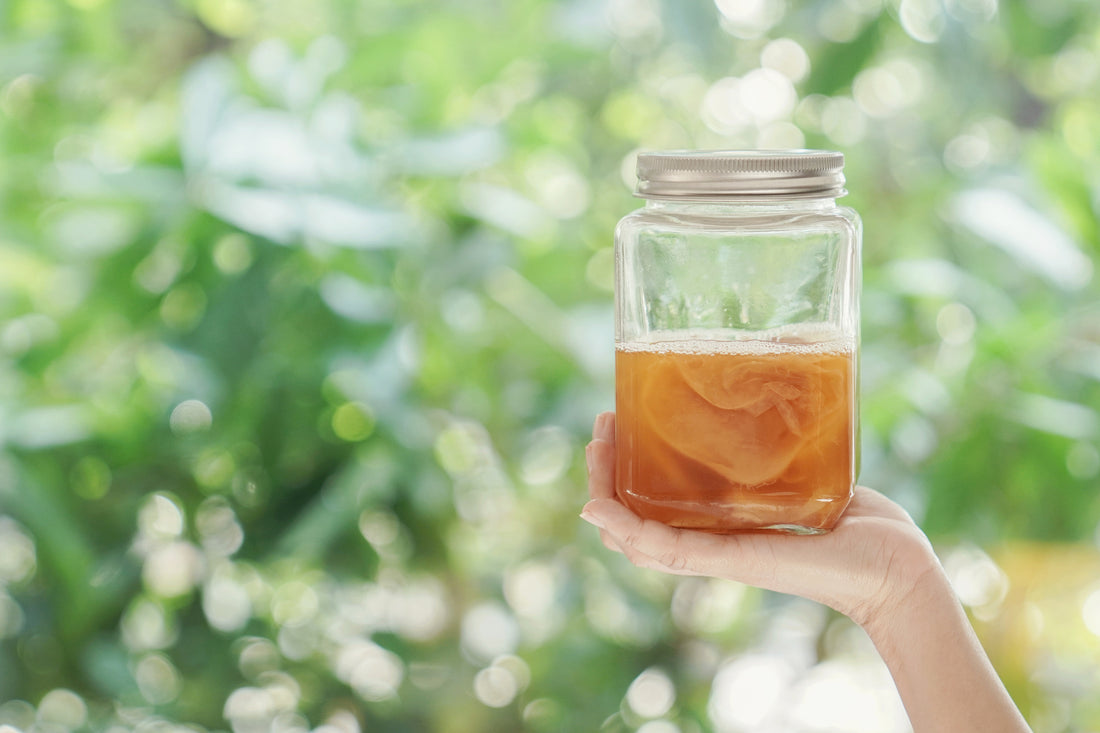The prevalence of irritable bowel syndrome prompts many to search for dietary solutions that alleviate the often-debilitating symptoms. Kombucha, a fermented tea beverage known for its potential benefits for gut health, is currently under the spotlight. If you have IBS, delve into the possible relationship between kombucha and IBS to learn more about the potential advantages, challenges, and considerations when incorporating this drink into your life.
What Are the Basics of Kombucha and IBS?
The origins of kombucha are in ancient traditions. It only requires three main ingredients:
- Tea: Either green or black tea can serve as the base for kombucha, providing the essential nutrients that fuel the fermentation process.
- Sugar: Cane sugar or other natural alternatives feed the microorganisms responsible for the fermentation process.
- SCOBY: The symbiotic culture of bacteria and yeast is a rubbery, pancake-like disc that turns tea and sugar into kombucha.
The simple fermentation process involves brewing the tea and adding the sugar. Next, kombucha makers introduce the SCOBY, which metabolises the sugar and converts it into a mix of enzymes, vitamins, organic acids, and probiotics. The microorganisms work their magic to transform the sweet tea into kombucha, producing the carbon dioxide that naturally carbonates the drink. This beverage has properties that open the possibility of drinking kombucha for IBS symptom alleviation.
Understanding IBS
IBS is a common gastrointestinal disorder that affects the functioning of the digestive system. The collection of symptoms that characterise the disease includes abdominal pain or discomfort, bloating and gas, changes in bowel habits, and urgency to have a bowel movement.
There are subtypes of IBS based on the primary symptoms. For example, IBS-D presents as diarrhea and abdominal pain, and IBS-C predominantly manifests as constipation. For some patients, the symptoms do not fit into a specific type.
The causes of IBS are still somewhat of a mystery. Still, most doctors agree that it stems from a combination of dietary factors, hypersensitivity, stress, and anxiety, and many are looking into the benefits of probiotic drinks for IBS.
Is Kombucha Good for IBS?
In liquid or instant form, kombucha could be good for IBS symptoms due to its probiotic content, digestive benefits, and potential anti-inflammatory properties.
Probiotic Potential
The probiotic potential of kombucha is a significant reason for its popularity, particularly when it comes to gut health. Probiotics are live microorganisms, known as good bacteria, that can provide various health benefits when consumed. During the fermentation process of kombucha, the SCOBY also produces organic acids, vitamins, and enzymes. These acids and enzymes, alongside the live microorganisms introduced by the SCOBY, contribute to the probiotic content of the beverage.
The benefits of these probiotics include:
- Helping to maintain a diverse and balanced population of bacteria in the gut to aid in digestion and gut health
- Assisting in breaking down complex foods and reducing gastrointestinal discomfort
- Aiding the significant portion of the immune system that resides in the gut
Probiotics also have anti-inflammatory properties. These are all elements that could help soothe the common symptoms of IBS.
Digestive Aid
A major benefit of the kombucha-IBS relationship is the drink's digestive properties. Kombucha contains enzymes produced during the fermentation process that can help break down complex molecules in food. This process makes it easier for the body to absorb nutrients, vitamins, and minerals more effectively. The probiotics can contribute to creating a balanced gut microbiome, which plays a crucial role in digestion and helps improve your overall digestive health.
Potential Anti-Inflammatory Effects
Having a well-balanced gut may help with inflammation issues. Experts do not know the exact mechanisms of how kombucha helps with IBS. However, the presence of probiotics, organic acids, and other compounds suggests that it could help reduce inflammation in the gut, and this inflammation probably exacerbates IBS symptoms.
Kombucha contains acetic acid, gluconic acid, and lactic acid, each studied for their potential anti-inflammatory properties. For example, acetic acid can help to reduce inflammation in the gut lining, which is particularly beneficial for people with IBS. Kombucha also has antioxidants that can help neutralise harmful free radicals that cause cell damage and inflammation in the gut. Helping manage that inflammation may reduce the symptoms of IBS.
What Should You Consider Before Drinking Kombucha With IBS?
While there are many benefits in drinking kombucha, there are a few things you should consider before making it part of your journey to gut health if you have IBS:
- Consulting with a healthcare professional: No one understands your personal IBS history better than your doctor. They can advise you based on your specific IBS symptoms and triggers.
- Individual sensitivities: IBS is a highly individualised condition. What works for one person might not work for another. Therefore, consuming kombucha may bring relief to some, while others might experience worsening symptoms.
- Triggers and restrictions: Consider your dietary guidelines or restrictions to manage your IBS before drinking kombucha. Some ingredients, such as certain types of tea or added fruits in specific flavours, might not work for your diet.
- Fermentation byproducts: One of the most significant concerns regarding kombucha and IBS is that fermenting produces trace amounts of alcohol. For some individuals, alcohol can trigger an IBS flare-up or worsen existing symptoms.
- Carbonation and acidity: Not everyone with IBS will tolerate the carbonation and acidity in kombucha well. However, that is likely only the case if you are sensitive to fizzy drinks or highly acidic foods.
When you decide to try kombucha, start with a small amount to gauge your body's response. Introducing new foods or drinks too quickly can sometimes lead to digestive discomfort. Pay attention to how your body responds after drinking it, and keep track of any changes in symptoms.
Where Can You Find High-Quality Kombucha for IBS?
Individual responses to kombucha can vary, but many people find that incorporating it into their diet supports better digestion. Instant kombucha offers a fast and easy way to access a drink whenever and wherever you need it. If you want to try kombucha for IBS and other improvements to your gut health, shop a range of raw, vegan, all-natural instant Kombucha from Superfoods Company.

